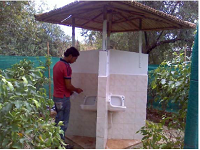India
A possible set of guidelines for integrating 'land ethic' principles into planning and construction of green buildings in India
Posted on 08 Feb, 2013 03:59 PMAldo Leopold’s ‘Land Ethic’ defines the relationship between people and nature, and simply enlarges the boundaries of the community to include soil, water, plants and animals, or collectively: the land.
Operational guidelines of Mahatma Gandhi National Rural Employment Guarantee Act 2005 by Ministry of Rural Development (2013)
Posted on 08 Feb, 2013 12:32 PMThis document by Department of Rural Development, Ministry of Rural Development provides operational guidelines of Mahatma Gandhi National Rural Employment Guarantee Act (2005). These guidelines aim at enhancing rural livelihoods by strengthening agricultural productivity.
Performance of expert appraisal committee for river valley and hydroelectric projects from 2006-2012 - Analysis by South Asia Network on Dams, Rivers and People
Posted on 07 Feb, 2013 12:58 PMWhile developmental projects are beneficial for growth of an economy they do have negative impact on the environment. This impact varies significantly by project type, size and location. In order to identify, examine, assess and evaluate the probable impacts of a proposed project on the environment the Ministry of Environment & Forest (MoEF) in 2006, constituted different committees. The committees are called as Expert Appraisal Committees (EAC). An EAC committee on River Valley & Hydroelectric projects was also set up on these lines. In the backdrop this South Asia Network on Dams, Rivers and People (SANDARP) an informal network of organisation and individuals working on water issues has come up with an analysis on how have this committee performed till now? This document presents an analysis of the same.
A simple yet effective filtration and sterilization technique to obtain clean drinking water: Paper in the Current Science Journal
Posted on 06 Feb, 2013 07:40 PMThe paper ‘Simple filtration and low-temperature sterilization of drinking water’, describes how a straight forward, simple technique can provide clean drinking water that is pathogen free, using a simple sari!
A communication and advocacy strategy framework for sanitation and hygiene, by the Ministry of Drinking Water and Sanitation and UNICEF (2012-17)
Posted on 05 Feb, 2013 08:44 PMThe number people practicing open defecation in India is more than 600 million. Though the access to improved sanitation has increased since 2000 the pace of change has been slow. If the current trend continues then it will be difficult for the country to meet its Millenium Development Goal for sanitation. Thus accelerating access to and use of toilets and hygiene practices have become a national priority.
Punjab ranks highest in the country, in level of water pollution caused by industries - Roundup of the week’s news (January 28 - February 3, 2013)
Posted on 04 Feb, 2013 05:20 PMWater pollution by industries: Punjab ranks highest
State-wise data on damage caused due to floods during 1953-2011- A compilation by Central Water Commission
Posted on 04 Feb, 2013 02:05 PMFloods/heavy rains can cause a severe and irreversible damage to human lives, property both public and private, and livestock. Since floods are one of the frequent natural calamities faced by India, the loss incurred by it is huge.
Tamil Nadu government allocates Rs.100 crore to strengthen water resources across the state- Newsletter from 'The Resource and Information Network for the Coasts (TRINET)', February 2013
Posted on 04 Feb, 2013 01:26 PM
The February edition of the TRINet has the following highlights:
The city corporation of Madurai decides to power all the parks with solar energy.
A resource book on waterless urinals, an ecological sanitation method that saves water, energy and uses urine as a resource
Posted on 02 Feb, 2013 05:40 PM
Waterless urinals (WLU) save water, energy and use urine as resource ( Image courtesy: R Sakthivel)